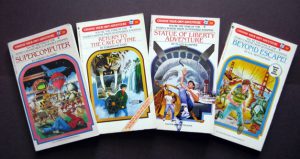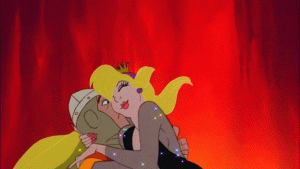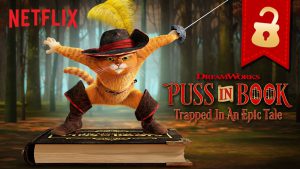From Mav: In the last couple of weeks I’ve seen a lot of people on the Internet raving about the Netflix show Black Mirror: Bandersnatch. I’ve also seen them raving about Bird Box but it was the former that got my attention because it is being billed as an innovative new thing – “Choose Your Own Adventure” movies. Since all of us on the show are big’ol geeks, its no surprise that we maybe read a CYOA book or two (or 50) as kids. I personally am also pretty fascinated by the concept of immersive television and media. I may be the only person around who cares about films like Hardcore Henry or TV show’s like Secret Girlfriend (admit it… you’re going “huh?” right now to both of those). I’m actually not a fan of Black Mirror in general, but based on the concept alone, I figured we just had to do an episode on this thing.
A couple weeks ago when we recorded our media addiction episode, we talked very briefly about the question of whether or not television (and movies) were active or passive entertainment. That is, some people believe that reading is better than TV because it forces the consumer to engage more with the material. I made the argument that that was bullshit… it’s just that we don’t think about the complex processing that is going on in our mind whenever we watch something. There’s a lot of mental processing that goes on just to understand a film… even more if you want to analyze or critique it on any level. But I feel like CYOA books have a little something extra. I’d argue that in all texts, to some extent or another, the reader and the writer are working together to create the story in the reader’s mind. That’s why suspension of disbelief is a thing. The reader has agency to accept or reject the story as it unfolds — to add their own experience to the head canon of the story. CYOA lets the reader feel directly connected, as though they are specifically influencing the direction of the story. It *feels* more actively engaging. So this was exciting for me.
So I watched it… (which was a struggle in and of itself because my preferred method of Netflix watching is TV and that doesn’t work — nor do most similar set top boxes like Chromecast and Fire Stick too apparently — so I had to update the Netflix client on my PS4 that was years out of date… ) and as a big’ol geek, I took notes as I went, noting what decisions I made and my thoughts about how it felt like I was influencing the story.
I was actually kind of disappointed. I understood that the movie was making a statement ABOUT the nature of content and entertainment and multiple narratives and the illusion of choice and the illusion of free will and… a lot of other shit… and I guess it was trying to be deep… but it just sort of forgot to tell me a story. I just wasn’t invested in anyone at all. And the choices that I was given all seemed either too trivial or too huge. One of the things I loved about those books when I was a kid was saying “ok, here are two to three logical choices. I wonder which one is right. I shall put a bookmark here so I can explore this and come back later and explore the other.” Here I often felt like either “those are two stupid choices” or “I really don’t care about this choice at all.” And to an extent, the show covers this up, by (at least in some versions) making it clear that that’s sort of the point. But at least for me, that didn’t make it entertaining. Maybe thought provoking… but not exactly fun.
I also considered at this point that perhaps the show might have been more fun if it were more immersive. I mentioned earlier the action movie Hardcore Henry and the TV sitcom Secret Girlfriend. Neither if these things are actually good. What makes them interesting is that they are both “first-person films.” Basically, they’re shot from the perspective of the protagonist who has a GoPro on his head, and all the other characters treat the protagonist as though it’s YOU. Sort of low-budget, proto-VR. Basically, like Doom or any other first-person shooter. Everyone talks to the camera (you) and everyonce in a while you see your hands out in front of you. In Hardcore Henry, it’s you that is a cybernetic super-spy running around shooting people and jumping out of planes. In Secret Girlfriend it’s you is douchey dudebro trying to fuck a never ending string of cliche hot women most of whom aren’t terribly bright or emotionally developed. Again neither of these things are actually GOOD. I said they were INTERESTING. The one-dimensional characters and simplistic storylines are enhanced by dropping the viewer INTO the the narrative from a visual perspective. Even though neither gives you any more choice in your action than a viewer has for any other movie, it FEELS more immersive than Bandersnatch. It’s a gimmick for sure. It would probably be too hokey for something like what Netflix is trying to do with the Black Mirror series. But the fact that I found myself missing the connection when watching Bandersnatch and missing the first person perspective (which is actually common in many CYOA books) points to a sort of problem that I think the film doesn’t know how to solve.
I think maybe one of my biggest problems with it is that it ultimately fails as a film AND as a game. Not only was I not invested in the story because the narrative wasn’t really deep or engaging enough for me to care about the characters or what happened to them… but the experience isn’t really immersive enough for me to enjoy it as a game. I think on some level CYOA books or even early video games like Zork, Kings Quest, or even Leisure Suit Larry work because of a combination narrative investment and either gameplay immersion or skill. It’s enjoyable feeling like you have some hand in creating the story. But Bandernatch largely robs you of that since the choices seem arbitrary and nonsensical (again, that being part of the point doesn’t make it fun). Obviously, not all video games need to have deep stories. I’ll play Tetris for hours just like everyone else. But to the extent that this feels like a video game there isn’t enough to DO to make me feel immersed either. We’ve talked about the game Dragon’s Lair before. It certainly isn’t an interesting narrative, and you don’t have any real “choices” but the engagement with it is having to master the skill in order to make the story “go.”In effect, Tetris and Dragon’s Lair are fun for the same reasons. Bandersnatch was missing all of that for me. It wasn’t interesting and it wasn’t really “fun.”
But then afterwards I watched the interactive Puss In Book… it was delightful! Don’t get me wrong. It wasn’t high art or anything. It’s clearly made for like 5 year olds (you know, totally on my level). But what it has going for it is that the meaningless of the choices you make work, because the story isn’t trying to be more than it is. The entire narrative of this film is that Puss In Boots is stuck inside of a fairytale collection volume by a mysterious unseen narrator. So your job is to “help” Puss get out by making choices as the story proceeds. But all of your choices are essentially “which story do you want to see next” or “what do you want Puss to do in this situation?” And that works. It’s instantly rewarding. I say I want to watch Puss interact with Goldilocks and the three bears, and… he does. I say I want Puss to fight a tree (yes, this was a choice) and he does! I have power and it works. It makes sense. As opposed to Bandersnatch where I am supposed to make a decision between breakfast cereals and hope that some crazy butterfly effect doesn’t (or does) destroy the world.
Yes… I get that the point of Bandersnatch is that 1) these innocuous seeming choices might do that… and 2) that’s ok because with an infinite set of parallel stories, this is irrelevant since I can always do it over. But the problem is the story wasn’t fulfilling enough for me to care. And I want to care. Seriously… there’s a whole section of my dissertation on this very concept… multiple inheritance and branching narratives. But I didn’t pretend that was a story. It was literary theory I was designing. And here I felt like Bandersnatch was getting in the way of itself. If I want theory and analysis, I’ll go find it. And I did. In fact, I had a blast spending like an hour investigating the decision tree map that IGN published. But not with Puss In Book! Like I said, delightful!
From Hannah: I don’t watch Black Mirror because I just don’t. I spend a lot of time watching goofy things like Puss in Book or The Good Place because that’s a lot more fun than a science fiction series with dark commentary about the world. But, as a kid, I had a weakness for Goosebumps “choose your own adventure” novels (which, to be fair, are kind of goofy), so I was pretty excited about Bandersnatch. (Also: did anyone catch that it’s a Lewis Carroll reference?)
As Mav said, Black Mirror: Bandersnatch spends a lot of its time discussing the tension between individual choice and free will. And maybe it works better depending on what story line you chose. But I was also struck, while spending my time working through the show, on how even though Stefan, the protagonist, feels like he’s being controlled by external forces (the nature of a choose your own adventure show or video game or book), the viewer is also controlled by the limited choices Netflix gives you.
Black Mirror, as I said, is some sort of contemporary Twilight Zone that spends its time trying to freak its viewers out. So when I attempted to make “ethical” or “healthy” choices (like talking to the psychiatrist or being honest with Stefan about what Netflix is), I eventually ended up being re-routed — multiple times — to previous decision to create a new, real ending. Black Mirror didn’t want to give me a positive outcome. It wanted me to fall into the conventions of the genres it plays with. I eventually ended up with an ending where “Stefan” turns out to be a character an actor is playing — although the character believes he truly is the character. So, for me, I felt like the interactive television show emphasized how although we are given choices, the viewer is still at the whims of the creator (as the creator seems to also be at the whims of the genre and the “feel” of the show). Puss in Book is going to be delightful because Puss is delightful. Bandersnatch is going to attempt to be unsettling because that’s the show. You can’t break the mold too much, even if you’re given the illusion of choice.
From Mav: Anyway, I’m really interested to pick this apart with people. So let us know your thoughts. Did you like this thing? Why or why not? What could have made it better or worse? Did you read CYOA style books when you were a kid? Have you watched/played any other films like this? What is the future of this as a medium?












Okay, so I loved the experience, BUT the reasons were more selfish than entertainment. I am a huge Black Mirror fan, the episodes White Christmas, Hated in the Nation, Nosedive, Waldo Effect – the show’s concept is that our addictions to screens reflect our true, imperfect selves. Cautionary tales, like Twilight Zone. They’re not all winners, but I digress. I loved the Bandersnatch experience because I made choices that only caused 1 reroute, and I felt proud that I crafted for myself a movie that unfolded as I felt it would given the circumstances. Stefan’s dads hiding something, the other developer is a bitter prodigy about to snap, and Stefan lives with guilt. My wife had tried watching it on her own and kept having to go back, so again, my reasoning was ‘I made a Black Mirror’ movie and that’s cool. Now, as a CYOA, it was lacking for sure. But I think that’s because of the limitations of the technology and the amount of filmed material. I even heard the creators can’t access everything. And CYOA publishers are suing them to boot. As a Black Mirror it was decent, like Hannah said it’s limited to the shows format and expectations. As a new technology it’s just a stepping stone.
I went down every winding path. Once the show admitted to me what its plan was I kind of knew what to expect and had fun with it. I also appreciate the weird allusion to the IRL failed Bandersnatch game, but that’s just because I’m a sucker for useless trivia about a hobby I enjoy. Also props on Hardcore Henry, that’s another film I really enjoyed because of the absurdity and less of as a film/story. I think those things proved, like you said more or less, that you can create an interesting and even successful product through gimmicks instead of content.
That said as a longtime game enthusiast and CYOA reader Bandersnatch treaded a lot of old ground in its story concept for me. Games like Doki Doki Literature Club (a dating game that turns horror when the meta plot involves you exploring your own hard drive and deleting files, etc. to stop a sentient selfaware program that is corrupting the game because it has fallen in love with the IRL player controlling the protagonist) or the Zero Escape Franchise (an escape room adventure game designed around meeting your demise in various timelines and taking that knowledge to unlock paths in other timelines with knowledge your character shouldn’t have) have done the same thing but better.
Overall an interesting concept to see go mainstream.